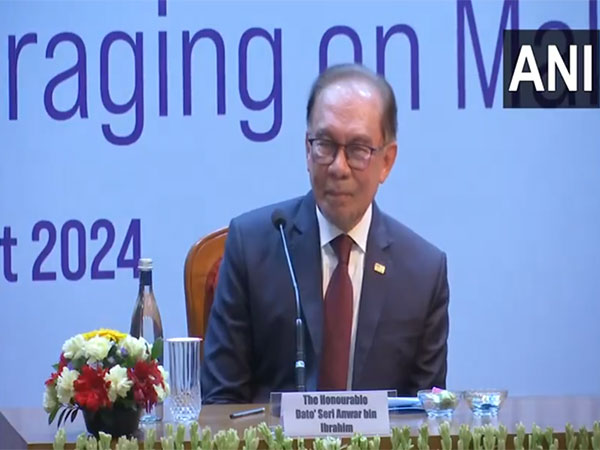Malaysian Prime Minister Anwar Ibrahim said that the Quad’s agenda regarding the Indo-Pacific is to avoid action that can be misconstrued as a provocation.
Ibrahim said that the position of centrality is paramount in ensuring a peaceful region.
“Our position of centrality, is to avoid any action or decision or policy or move that could be construed to be unnecessarily provocative. That position to me is paramount, is pertinent in ensuring a peaceful region, particularly in the Asia Pacific, both in the Indian Ocean or the Chinese South China Sea. And I think that position should be respected. As far as we are concerned bilaterally, we should engage,” he said.
Talking about a possibility of the Yuan superseding the Dollar in the future, Ibrahim said, “The dollar is still an important for exchange, but why should we be obsessed or dependent on that? We are working on a viable alternative that will be more just. I told the Prime Minister [Modi] during the bilateral session, that last year, growth in investments was impressive, inflation was down low 2%, unemployment 3%, and still major attack on the Ringgit. Nothing to do with economic fundamentals, just what FED in Washington DC decide. So there’s nothing much we can do except to use other avenues where we can help resolve and ease the impact. That is why we still are dependent in some areas, the transactions in dollars. But we use our own local currency denominations to ensure that at least we have certain percentage into our deals. That could probably reduce the negative impact. Because finally, in managing the economy, we talk about fundamentals. The fundamentals are well guarded. And there are tough measures,” he said.
Ibrahim said that despite all measures of good governance, they were subjected to the decision of FED.
“Subsidiary rationalization, ensuring quality education public health, basic infrastructure, good governance, combating against excesses and corruption, everything is being done. But, still we are finally subjected to the decision and the Fed. This, of course, is not a fair international financial architecture…The over-dependence on a system that do not cater for the interests of the majority or the principle of just order, be it in the trade or in financial architecture, cannot be accepted any longer. Since we do not have the capacity to change now, we do it in our own way at least reduce impact. And I think if we can use, for example, a fraction, 20 per cent or 30 per cent in our local currency, it will ease the negative impact,” he said.
Ibrahim said that politics and governance is about welfare of the people, not ego of one or two personalities.
“Multilaterally we should engage. So any move… may not be intentionally construed as provocative, but if it’s seen but the other side provocative, you need to engage and avoid because there’s too much at stake. And to me, politics and governance is about welfare of the people, not ego of one or two personalities. Our people have suffered immensely and it is our commitment, having leading governments and leaders to ensure that we have policies that remain sane to focus on the welfare of people. And this is to me an excellent time post Covid. After such hardship, it is time that we refocus.”
Ibrahim added that India has produced great sages and leaders and is considered by many of us a beacon of hope and democracy in the region.
“India is to me remains an enigma. I’ve been here umpteen times as a student leader and I told Suman Bhakti that I had the occasion even as a young student leader to have a session with Prime Minister Indira Gandhi, nine youth leaders from Asia confronting her a number of issues and observe her candour and motherly attitude to deal with some very pernicious questions raised by young leaders on the issue of corruption or issue of racism, issue of religious bigotry. This is the country that produces Sri Aurobindo, an outstanding intellect, and leaders like Gandhi ji, which is of course unique in his battle for freedom, justice, for humanity. You have intellectual giants who became leaders in their own countries, Jawaharlal Nehru and Mohammed Ali Jinnah. India has produced great sages and leaders and is considered by many of us a beacon of hope and democracy in the region. I will not deny the fact that you also have to grapple with some serious issues affecting minorities or religious sentiments,” he said.
Ibrahim hoped that India continues to play its traditional role of recognising values of freedom.
“Our hope is that India continues to play its role, rightful role because I mentioned to Prime Minister Modi, that these were the years when Nehru and Zhou Enlai and Sukarno and Nyerere were there standing up for the global south against colonialism and imperialism and to struggle to ensure that we recognize what humanity is about, what freedom is all about, and what dignity of men and women,” he said.-ANI


